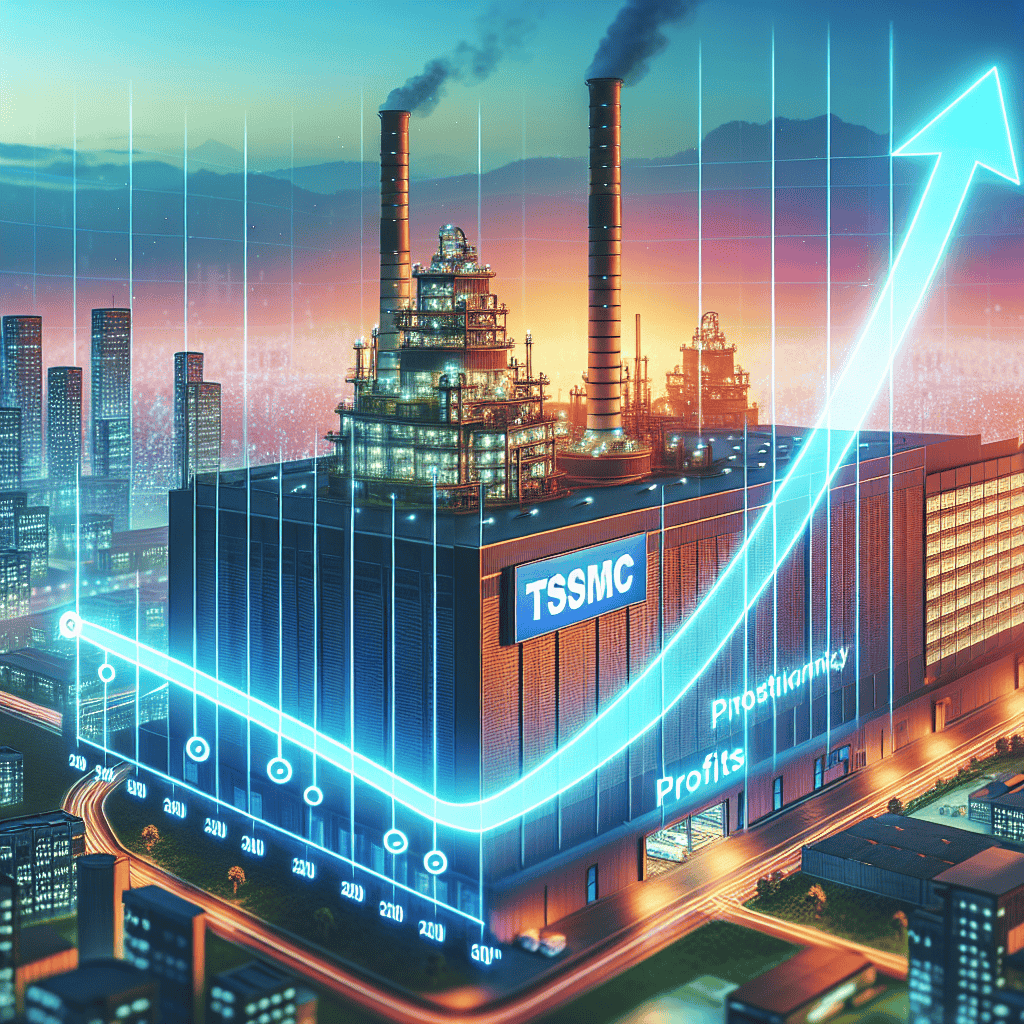“TSMC: Powering the Future with AI-Driven Profitability”
Introduction
Taiwan Semiconductor Manufacturing Company (TSMC), the world’s leading contract chipmaker, is strategically positioned to capitalize on the burgeoning demand for artificial intelligence (AI) technologies. As AI continues to revolutionize industries, driving the need for advanced semiconductor solutions, TSMC’s cutting-edge manufacturing capabilities and robust technological portfolio place it at the forefront of this transformative wave. The company’s commitment to innovation and its ability to deliver high-performance, energy-efficient chips are expected to fuel substantial profit growth. With AI applications expanding across sectors such as autonomous vehicles, data centers, and consumer electronics, TSMC is poised to leverage its industry leadership to capture significant market share and drive robust financial performance in the coming years.
TSMC’s Strategic Positioning in the AI Revolution
Taiwan Semiconductor Manufacturing Company (TSMC) stands at the forefront of the semiconductor industry, strategically positioned to capitalize on the burgeoning demand for artificial intelligence (AI) technologies. As AI continues to permeate various sectors, from healthcare to automotive, the need for advanced semiconductors has surged, placing TSMC in a favorable position to reap substantial profits. The company’s robust infrastructure and innovative capabilities have enabled it to meet the increasing demands of AI-driven applications, thereby solidifying its status as a pivotal player in the global semiconductor market.
The rise of AI has necessitated the development of more sophisticated and efficient chips, which are essential for processing the vast amounts of data required by AI algorithms. TSMC’s commitment to innovation is evident in its continuous investment in research and development, which has allowed it to produce cutting-edge chips that cater to the specific needs of AI applications. By leveraging its advanced manufacturing processes, TSMC has been able to deliver high-performance chips that are both energy-efficient and cost-effective, thereby attracting a wide array of clients seeking to integrate AI into their operations.
Moreover, TSMC’s strategic partnerships with leading technology companies have further bolstered its position in the AI revolution. Collaborations with industry giants such as Apple, NVIDIA, and AMD have not only expanded TSMC’s client base but also enhanced its technological capabilities. These partnerships have facilitated the exchange of knowledge and expertise, enabling TSMC to stay ahead of the curve in the rapidly evolving semiconductor landscape. As a result, TSMC has been able to maintain a competitive edge, ensuring its continued dominance in the market.
In addition to its technological prowess, TSMC’s strategic geographic location has also played a crucial role in its success. Situated in Taiwan, a hub for semiconductor manufacturing, TSMC benefits from a well-established supply chain and a skilled workforce. This advantageous positioning has allowed the company to efficiently scale its operations to meet the growing demand for AI chips. Furthermore, TSMC’s proactive approach to addressing potential supply chain disruptions, such as geopolitical tensions and natural disasters, has ensured the stability and reliability of its production processes.
As the AI industry continues to expand, TSMC’s financial outlook remains promising. The company’s ability to adapt to changing market dynamics and its unwavering focus on innovation have positioned it to capture a significant share of the AI-driven semiconductor market. Analysts predict that TSMC’s revenue will continue to grow as more industries adopt AI technologies, further solidifying its status as a leader in the semiconductor industry.
In conclusion, TSMC’s strategic positioning in the AI revolution is a testament to its foresight and adaptability. By investing in cutting-edge technology, forging strategic partnerships, and leveraging its geographic advantages, TSMC has positioned itself to capitalize on the growing demand for AI semiconductors. As AI continues to transform industries worldwide, TSMC’s role as a key enabler of this technological shift is set to drive robust profits, ensuring its continued success in the years to come.
How TSMC’s Advanced Chip Technology Drives AI Growth
Taiwan Semiconductor Manufacturing Company (TSMC) stands at the forefront of the semiconductor industry, poised to capitalize on the burgeoning demand for advanced chip technology driven by the rapid growth of artificial intelligence (AI). As AI applications proliferate across various sectors, from autonomous vehicles to healthcare diagnostics, the need for more powerful and efficient chips has never been greater. TSMC, with its cutting-edge manufacturing capabilities and strategic investments in research and development, is uniquely positioned to meet this demand, thereby securing robust profits and reinforcing its leadership in the global semiconductor market.
The surge in AI applications has created an insatiable appetite for high-performance computing power, which in turn has fueled the demand for advanced semiconductors. TSMC’s expertise in producing chips with smaller nodes, such as the 5-nanometer and the upcoming 3-nanometer processes, allows for greater transistor density and improved energy efficiency. These attributes are crucial for AI workloads, which require immense computational power and efficient energy consumption to process complex algorithms and large datasets. By leveraging its advanced manufacturing processes, TSMC is able to deliver chips that meet the stringent requirements of AI applications, thereby attracting major clients such as Apple, NVIDIA, and AMD, who are at the forefront of AI innovation.
Moreover, TSMC’s commitment to innovation is evident in its substantial investment in research and development. The company allocates a significant portion of its revenue to R&D, ensuring that it remains ahead of the technological curve. This investment not only enhances TSMC’s manufacturing capabilities but also enables the company to explore new materials and technologies that could further revolutionize chip design. For instance, TSMC is actively researching the potential of 2D materials and advanced packaging techniques, which could lead to even more powerful and efficient chips in the future. Such forward-thinking initiatives underscore TSMC’s dedication to maintaining its competitive edge in the rapidly evolving semiconductor landscape.
In addition to its technological prowess, TSMC’s strategic partnerships play a crucial role in driving its success in the AI domain. By collaborating with leading technology companies and research institutions, TSMC gains valuable insights into emerging trends and customer needs. These partnerships facilitate the co-development of innovative solutions tailored to specific AI applications, thereby enhancing TSMC’s ability to deliver customized products that meet the unique requirements of its clients. Furthermore, these collaborations often lead to long-term contracts, providing TSMC with a stable revenue stream and reinforcing its position as a trusted partner in the semiconductor industry.
As the AI market continues to expand, TSMC’s advanced chip technology is set to play a pivotal role in shaping the future of AI. The company’s ability to produce high-performance, energy-efficient chips not only addresses the current demands of AI applications but also anticipates future needs as AI becomes increasingly integrated into everyday life. By maintaining its focus on innovation, strategic partnerships, and customer-centric solutions, TSMC is well-positioned to capitalize on the opportunities presented by the AI surge, ensuring robust profits and sustained growth in the years to come. In conclusion, TSMC’s advanced chip technology is not only driving AI growth but also solidifying the company’s status as a leader in the semiconductor industry, poised to thrive in an era defined by technological advancement and digital transformation.
The Role of TSMC in Powering Next-Gen AI Applications
Taiwan Semiconductor Manufacturing Company (TSMC) stands at the forefront of the semiconductor industry, playing a pivotal role in the development and deployment of next-generation artificial intelligence (AI) applications. As the demand for AI technologies continues to surge, TSMC’s advanced manufacturing capabilities position it as a critical enabler of innovation in this rapidly evolving field. The company’s robust infrastructure and cutting-edge technology have made it an indispensable partner for tech giants seeking to harness the power of AI.
The increasing complexity of AI models necessitates the use of highly sophisticated semiconductors, which TSMC is uniquely equipped to produce. With its state-of-the-art fabrication processes, TSMC is able to deliver chips that offer unparalleled performance and efficiency. This capability is crucial for AI applications, which require immense computational power to process vast amounts of data in real-time. As a result, TSMC’s chips are integral to the functionality of AI systems, from data centers to edge devices.
Moreover, TSMC’s commitment to innovation is evident in its continuous investment in research and development. By pushing the boundaries of semiconductor technology, TSMC ensures that it remains at the cutting edge of the industry. This dedication to advancement not only enhances the performance of AI applications but also drives down costs, making AI more accessible to a broader range of industries. Consequently, TSMC’s contributions are instrumental in accelerating the adoption of AI across various sectors, including healthcare, automotive, and finance.
In addition to its technological prowess, TSMC’s strategic partnerships further solidify its role in the AI ecosystem. Collaborations with leading technology companies enable TSMC to tailor its products to meet the specific needs of AI applications. These partnerships facilitate the co-development of innovative solutions that optimize the performance of AI systems. By working closely with its clients, TSMC ensures that its semiconductors are not only cutting-edge but also aligned with the evolving demands of the AI market.
Furthermore, TSMC’s global reach and extensive production capacity allow it to meet the growing demand for AI chips. As AI applications become more prevalent, the need for reliable and scalable semiconductor manufacturing becomes increasingly critical. TSMC’s ability to deliver high volumes of advanced chips positions it as a key player in the global supply chain, ensuring that AI technologies can be deployed at scale. This capability is particularly important as industries worldwide seek to integrate AI into their operations to enhance efficiency and drive innovation.
In light of these factors, TSMC is poised for robust profits as the AI market continues to expand. The company’s strategic positioning and technological leadership make it a vital component of the AI revolution. As AI applications become more sophisticated and widespread, the demand for TSMC’s advanced semiconductors is expected to grow exponentially. This growth trajectory not only underscores TSMC’s importance in the AI landscape but also highlights its potential for sustained financial success.
In conclusion, TSMC’s role in powering next-generation AI applications is multifaceted and indispensable. Through its advanced manufacturing capabilities, strategic partnerships, and global reach, TSMC is uniquely positioned to drive the future of AI. As the demand for AI technologies continues to rise, TSMC’s contributions will be crucial in shaping the trajectory of this transformative field, ensuring that it remains at the forefront of technological innovation.
TSMC’s Investment in AI: A Blueprint for Future Profits

Taiwan Semiconductor Manufacturing Company (TSMC), a global leader in semiconductor manufacturing, is strategically positioning itself to capitalize on the burgeoning demand for artificial intelligence (AI) technologies. As AI continues to permeate various sectors, from healthcare to automotive, the demand for advanced semiconductors is expected to rise exponentially. TSMC’s proactive investment in AI-related technologies and infrastructure is not only a testament to its foresight but also a blueprint for future profitability.
The company’s commitment to AI is evident in its substantial investment in research and development. TSMC has consistently allocated a significant portion of its revenue to R&D, ensuring that it remains at the forefront of technological advancements. This dedication has enabled TSMC to develop cutting-edge semiconductor technologies that are crucial for AI applications. By focusing on innovation, TSMC is well-equipped to meet the complex requirements of AI-driven industries, thereby securing a competitive edge in the market.
Moreover, TSMC’s strategic partnerships with leading technology firms further bolster its position in the AI sector. Collaborations with companies such as NVIDIA and Apple have allowed TSMC to refine its semiconductor manufacturing processes, ensuring that its products meet the high-performance standards demanded by AI applications. These partnerships not only enhance TSMC’s technological capabilities but also expand its customer base, providing a steady stream of revenue and reinforcing its market dominance.
In addition to technological advancements, TSMC’s investment in expanding its production capacity is a critical component of its AI strategy. The company has announced plans to build new fabrication plants, or fabs, in key locations around the world. These facilities are designed to produce advanced semiconductors at scale, addressing the growing demand for AI-related technologies. By increasing its production capacity, TSMC is poised to capture a larger share of the AI market, translating into robust profits in the coming years.
Furthermore, TSMC’s focus on sustainability and energy efficiency aligns with the global push towards environmentally friendly technologies. The company is investing in green manufacturing processes and renewable energy sources to reduce its carbon footprint. This commitment to sustainability not only enhances TSMC’s reputation but also attracts environmentally conscious clients who prioritize sustainable practices. As a result, TSMC is likely to see increased demand from companies seeking to align with eco-friendly partners, further boosting its profitability.
The global semiconductor shortage has underscored the importance of reliable supply chains, and TSMC’s strategic investments in AI are a testament to its resilience. By diversifying its supply chain and investing in advanced manufacturing technologies, TSMC is mitigating risks associated with supply disruptions. This resilience ensures that TSMC can consistently meet the demands of its clients, solidifying its position as a trusted partner in the AI industry.
In conclusion, TSMC’s investment in AI technologies and infrastructure is a strategic move that positions the company for sustained profitability. Through its commitment to innovation, strategic partnerships, expanded production capacity, and sustainability, TSMC is well-prepared to capitalize on the growing demand for AI applications. As the world increasingly embraces AI, TSMC’s blueprint for future profits serves as a model for other companies seeking to thrive in this dynamic and rapidly evolving sector.
Analyzing TSMC’s Competitive Edge in the AI Market
Taiwan Semiconductor Manufacturing Company (TSMC) stands at the forefront of the semiconductor industry, poised to capitalize on the burgeoning demand for artificial intelligence (AI) technologies. As AI continues to permeate various sectors, from healthcare to automotive, the need for advanced semiconductors has surged, positioning TSMC as a critical player in this transformative era. The company’s competitive edge in the AI market is underpinned by several strategic advantages, including its technological prowess, robust manufacturing capabilities, and strategic partnerships.
Firstly, TSMC’s technological leadership is a cornerstone of its competitive advantage. The company has consistently been at the cutting edge of semiconductor technology, pioneering advancements in chip design and manufacturing processes. Its ability to produce high-performance chips with smaller nodes, such as the 5nm and 3nm processes, has set it apart from competitors. These smaller nodes are crucial for AI applications, which require immense computational power and efficiency. By continually pushing the boundaries of what is technologically possible, TSMC ensures that it remains the go-to choice for companies seeking to integrate AI into their products.
Moreover, TSMC’s robust manufacturing capabilities further solidify its position in the AI market. The company operates a vast network of fabrication plants, or fabs, which are equipped with state-of-the-art technology. This extensive manufacturing infrastructure allows TSMC to meet the growing demand for semiconductors, ensuring a steady supply of chips to its clients. Additionally, TSMC’s commitment to maintaining high production standards and yield rates ensures that it can deliver reliable and high-quality products, a critical factor for companies developing AI technologies that require precision and dependability.
In addition to its technological and manufacturing strengths, TSMC’s strategic partnerships play a pivotal role in its success. The company collaborates with leading technology firms, including Apple, NVIDIA, and AMD, to develop custom chips tailored to specific AI applications. These partnerships not only provide TSMC with a steady stream of business but also enable it to stay at the forefront of AI innovation. By working closely with industry leaders, TSMC gains valuable insights into emerging trends and customer needs, allowing it to adapt its offerings accordingly.
Furthermore, TSMC’s focus on research and development (R&D) is instrumental in maintaining its competitive edge. The company invests heavily in R&D to explore new materials, processes, and technologies that can enhance chip performance and efficiency. This commitment to innovation ensures that TSMC remains agile and responsive to the rapidly evolving AI landscape. As AI applications become more sophisticated, the demand for semiconductors that can support complex algorithms and data processing will only increase, and TSMC is well-positioned to meet these challenges.
In conclusion, TSMC’s competitive edge in the AI market is a result of its technological leadership, robust manufacturing capabilities, strategic partnerships, and unwavering commitment to innovation. As AI continues to drive demand for advanced semiconductors, TSMC is poised for robust profits, leveraging its strengths to capitalize on this growth opportunity. By maintaining its focus on cutting-edge technology and strategic collaboration, TSMC is set to remain a dominant force in the semiconductor industry, playing a crucial role in shaping the future of AI.
TSMC’s Partnership Strategies to Enhance AI Capabilities
Taiwan Semiconductor Manufacturing Company (TSMC), a global leader in semiconductor manufacturing, is strategically positioning itself to capitalize on the burgeoning demand for artificial intelligence (AI) technologies. As AI continues to permeate various sectors, from healthcare to automotive, the need for advanced semiconductor solutions has never been more critical. TSMC’s robust partnership strategies are at the forefront of enhancing its AI capabilities, ensuring that the company remains a pivotal player in this rapidly evolving landscape.
One of the key elements of TSMC’s strategy is its collaboration with leading technology firms. By forging alliances with industry giants such as Apple, NVIDIA, and AMD, TSMC is able to leverage its cutting-edge manufacturing processes to produce high-performance chips tailored for AI applications. These partnerships not only provide TSMC with a steady stream of business but also enable the company to stay ahead of technological advancements. For instance, TSMC’s collaboration with NVIDIA has been instrumental in the development of GPUs that power AI-driven data centers, thereby reinforcing TSMC’s position as a critical supplier in the AI ecosystem.
Moreover, TSMC’s commitment to research and development (R&D) is another cornerstone of its strategy to enhance AI capabilities. The company invests heavily in R&D to innovate and refine its semiconductor manufacturing processes. This investment is crucial in maintaining TSMC’s competitive edge, particularly in the development of advanced nodes such as 5nm and 3nm technologies. These nodes are essential for producing chips that offer the performance and efficiency required for AI applications. By continuously pushing the boundaries of semiconductor technology, TSMC ensures that it can meet the growing demands of AI-driven industries.
In addition to its partnerships and R&D efforts, TSMC is also focusing on expanding its production capacity to accommodate the increasing demand for AI chips. The company has announced plans to build new fabrication plants, or fabs, in key locations around the world. These expansions are designed to not only increase TSMC’s output but also to mitigate risks associated with geopolitical tensions and supply chain disruptions. By diversifying its manufacturing footprint, TSMC aims to provide its clients with a reliable supply of semiconductors, thereby strengthening its position in the global market.
Furthermore, TSMC’s strategic initiatives are complemented by its commitment to sustainability and environmental responsibility. As the demand for AI technologies grows, so does the need for energy-efficient semiconductor solutions. TSMC is actively working to reduce the environmental impact of its manufacturing processes by adopting green technologies and improving energy efficiency. This commitment not only aligns with global sustainability goals but also enhances TSMC’s appeal to environmentally conscious clients and investors.
In conclusion, TSMC’s partnership strategies are a testament to its proactive approach in enhancing AI capabilities. By collaborating with leading technology firms, investing in R&D, expanding production capacity, and prioritizing sustainability, TSMC is well-positioned to capitalize on the AI surge. As the demand for AI technologies continues to rise, TSMC’s strategic initiatives will likely translate into robust profits, solidifying its status as a key player in the semiconductor industry. Through these efforts, TSMC not only meets the current needs of the market but also sets the stage for future growth and innovation in the AI domain.
The Impact of AI Demand on TSMC’s Financial Performance
Taiwan Semiconductor Manufacturing Company (TSMC), a global leader in semiconductor manufacturing, is experiencing a significant upswing in its financial performance, driven by the burgeoning demand for artificial intelligence (AI) technologies. As AI continues to permeate various sectors, from consumer electronics to autonomous vehicles, the need for advanced semiconductors has surged, positioning TSMC at the forefront of this technological revolution. This demand is not only reshaping the semiconductor industry but also bolstering TSMC’s profitability, as the company capitalizes on its technological prowess and strategic investments.
The rise of AI has necessitated the development of more sophisticated and powerful chips, which are essential for processing the complex algorithms that underpin AI applications. TSMC, renowned for its cutting-edge manufacturing capabilities, has been pivotal in meeting this demand. The company’s advanced process nodes, such as the 5-nanometer and the upcoming 3-nanometer technologies, are particularly well-suited for AI workloads, offering enhanced performance and energy efficiency. Consequently, TSMC has secured substantial orders from major tech giants, including Apple, NVIDIA, and AMD, who are at the vanguard of AI innovation.
Moreover, TSMC’s strategic focus on research and development has enabled it to maintain a competitive edge in the semiconductor industry. By investing heavily in R&D, TSMC has consistently pushed the boundaries of chip design and manufacturing, ensuring that it remains a preferred partner for companies seeking to integrate AI capabilities into their products. This commitment to innovation not only strengthens TSMC’s market position but also translates into robust financial returns, as evidenced by its impressive revenue growth in recent quarters.
In addition to its technological advancements, TSMC’s financial performance is further bolstered by its expansive global footprint. The company’s extensive network of manufacturing facilities and partnerships across the globe allows it to efficiently meet the growing demand for semiconductors. This global presence not only mitigates risks associated with geopolitical tensions and supply chain disruptions but also enhances TSMC’s ability to serve a diverse clientele, thereby driving sustained revenue growth.
Furthermore, the increasing adoption of AI across various industries is expected to fuel long-term demand for TSMC’s products. As sectors such as healthcare, finance, and automotive continue to integrate AI technologies to enhance efficiency and innovation, the reliance on advanced semiconductors is set to intensify. This trend underscores the critical role that TSMC plays in the AI ecosystem and highlights the potential for continued financial success.
However, it is important to acknowledge the challenges that TSMC may face in sustaining its growth trajectory. The semiconductor industry is highly competitive, with rivals such as Samsung and Intel also vying for market share in the AI domain. Additionally, the cyclical nature of the semiconductor market poses inherent risks, as fluctuations in demand can impact profitability. Nevertheless, TSMC’s strategic investments and technological leadership position it well to navigate these challenges and capitalize on the opportunities presented by the AI surge.
In conclusion, TSMC’s financial performance is poised for robust growth, driven by the escalating demand for AI technologies. Through its advanced manufacturing capabilities, strategic investments in R&D, and expansive global operations, TSMC is well-equipped to meet the needs of the AI-driven market. As AI continues to transform industries and drive innovation, TSMC’s role as a key enabler of this technological shift is set to underpin its financial success in the years to come.
Q&A
1. **What is TSMC’s role in the AI industry?**
TSMC is a leading semiconductor manufacturer, producing advanced chips essential for AI applications.
2. **How has the AI surge impacted TSMC’s business?**
The AI surge has increased demand for TSMC’s high-performance chips, boosting their production and sales.
3. **What are TSMC’s financial prospects amid the AI boom?**
TSMC is poised for robust profits due to the growing demand for AI-related semiconductor technologies.
4. **Which TSMC products are most in demand due to AI?**
TSMC’s advanced nodes, such as 5nm and 3nm chips, are highly sought after for AI processing tasks.
5. **How is TSMC addressing the increased demand for AI chips?**
TSMC is expanding its production capacity and investing in new technologies to meet the rising demand.
6. **What challenges does TSMC face in the AI market?**
TSMC faces challenges such as supply chain constraints, geopolitical tensions, and competition from other chipmakers.
7. **What is the outlook for TSMC’s growth in the AI sector?**
TSMC is expected to continue growing as AI technologies proliferate, driving sustained demand for their advanced chips.
Conclusion
Taiwan Semiconductor Manufacturing Company (TSMC) is strategically positioned to experience robust profits amid the surge in artificial intelligence (AI) demand. As a leading semiconductor manufacturer, TSMC benefits from its advanced technology and capacity to produce high-performance chips essential for AI applications. The increasing reliance on AI across various industries, from automotive to consumer electronics, drives significant demand for TSMC’s cutting-edge semiconductor solutions. Furthermore, TSMC’s strong relationships with major tech companies and its continuous investment in research and development ensure its competitive edge in the market. Consequently, TSMC is well-equipped to capitalize on the growing AI trend, promising substantial profit growth in the foreseeable future.





